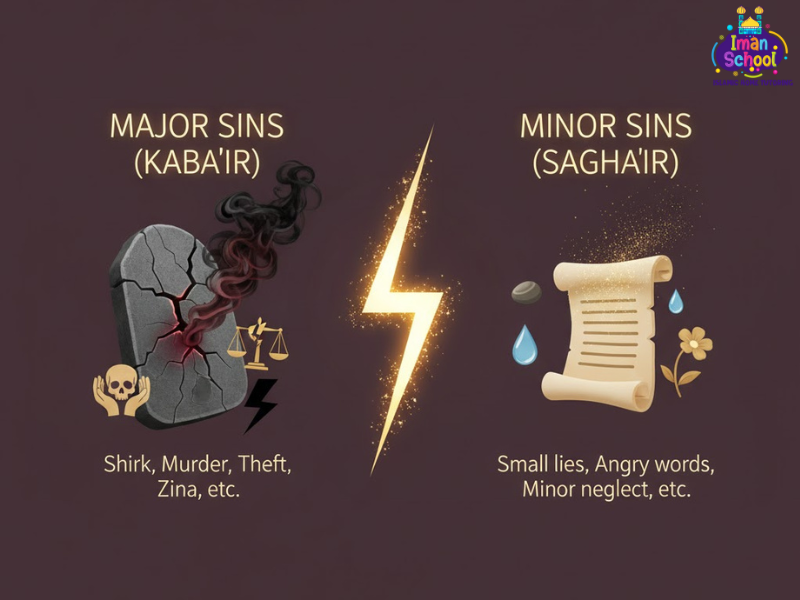For anyone exploring Islamic views on sin and accountability, understanding the difference between major and minor sins (Kaba'ir and Sagha'ir) is fundamental. Does every wrong action carry the same weight? How does Islam differentiate between a slip-up and a devastating moral transgression?
The distinct categories of Kaba'ir (Major Sins) and Sagha'ir (Minor Sins) clarify a Muslim's responsibilities and illuminate the pathway to repentance and forgiveness.
What is the Difference Between Major and Minor Sins (Kaba'ir and Sagha'ir)?
The primary difference between major and minor sins lies in the severity of the offense, its punishment, and the prescribed method for its expiation.
|
Feature |
Major Sins (Kaba'ir) |
Minor Sins (Sagha'ir) |
|
Severity |
Grave offenses; cause spiritual destruction. |
Lesser offenses; minor moral failings. |
|
Expiation |
Require Tawbah for major sins (sincere repentance) with specific conditions. |
Expiation of sins in Islam occurs through good deeds, repentance, or acts of worship. |
|
Consequence |
Carry a specific threat of Hellfire, curse, or severe punishment in this life or the next. |
No specific threat of Hellfire is mentioned for a single instance. |
|
Example |
Murder, Shirk and Kaba'ir (Polytheism). |
Looking at something forbidden, a small lie. |
The distinction is rooted in the Quran, which encourages believers to avoid the worst offenses:
"If you avoid the major sins [Kaba'ir] which you are forbidden, We will remove from you your lesser sins [Sagha'ir] and admit you to a noble entrance [Paradise]." (Quran 4:31)

Read More: Manners Every Muslim Should Know
Kaba'ir vs. Sagha'ir: Understanding the Categories of Sin in Islam
The classification of Kaba'ir (Major) and Sagha'ir (Minor) is crucial in Islamic Fiqh on sins.
Kaba'ir (Major Sins)
These are the most serious transgressions that strike at the heart of faith, morality, and justice. They are considered major sins that require repentance immediately and specifically. Scholars like Imam Dhahabi major sins compiled extensive lists based on textual evidence.
Sagha'ir (Minor Sins)
These are general faults, errors, or minor violations of etiquette or minor religious commands. They are understood to be inevitable human failings that God's Mercy covers easily.
The fundamental difference between Kaba'ir and Sagha'ir is not about the size of the sin itself, but about the severity of the consequence attached to it by Allah and His Messenger (PBUH).
The Criteria for a Major Sin (Kaba'ir):
Scholars of Islamic jurisprudence on sin have outlined five primary criteria for classifying a sin as Kaba'ir:
-
A Specific Legal Punishment: The offense has a set, defined punishment (Hadd) in Sharia (e.g., theft, adultery).
-
A Threat of Hellfire: The Quran or Sunnah specifically mentions Hellfire for the one who commits the act.
-
A Divine Curse or Wrath: The Quran or Sunnah mentions the curse or wrath of Allah upon the one who commits the act.
-
A Severe Warning: The act is described as a denial of faith or a severe crime against humanity.
-
Stating It is Worse than Another Major Sin: For example, Shirk and Kaba'ir is unanimously considered the greatest sin of all.
Any sin that meets one of these criteria is included in the list of major sins Kaba'ir, as detailed in texts like Al-Kaba'ir book summary.
Learn More: Human Rights in Islam
How Minor Sins (Sagha'ir) Are Forgiven: Good Deeds and Ablution
The beautiful aspect of the difference between major and minor sins is that Allah has provided simple, merciful mechanisms for the forgiveness of minor sins without formal Tawbah (repentance). This answers the question of how minor sins are forgiven in Islam:
-
Ablution (Wudu): The Prophet (PBUH) said that when a servant performs Wudu perfectly, the sins leave his body, even from under his fingernails (Muslim).
-
Five Daily Prayers: The prayers are an expiation of sins in Islam between them, as long as the person avoids the Kaba'ir.
-
Ramadan/Hajj: Fasting the month of Ramadan or performing the Hajj pilgrimage is a means of wiping away past Sagha'ir.
-
General Good Deeds:
"Indeed, good deeds do away with evil deeds." (Quran 11:114)
The Seven Destructive Sins: A List of the Greatest Kaba'ir
The most famous list of Kaba'ir is mentioned by the Prophet (PBUH) in a well-known major sins Hadith:
The Prophet (PBUH) said: "Avoid the seven destructive sins." They asked, "O Messenger of Allah, what are they?" He said:
-
Shirk and Kaba'ir (Associating partners with Allah).
-
Sorcery/Magic.
-
Killing a soul which Allah has forbidden, except by right.
-
Consuming usury (Riba).
-
Consuming the property of an orphan.
-
Fleeing from the battlefield at the time of fighting.
-
Slandering chaste, innocent believing women.
This list is the core of the seven destructive sins Islam, but scholars note that the complete major sins in Islam list is much longer.
Discover More: Islamic Law
The Danger of Minor Sins: How Sagha'ir Lead to Kaba'ir
Though minor sins are easily forgiven, Islam warns against trivializing them. A fundamental truth about the difference between major and minor sins is that Sagha'ir can, over time, become Kaba'ir.
Repetition
When one repeatedly commits a minor sin without remorse or repentance, it eventually constitutes a major sin due to the persistence and lack of reverence for Allah's commands. This is how minor sins that become major through heedlessness.
Trivializing
Intentionally treating a minor sin as unimportant is a major spiritual danger, as it shows disrespect for the boundaries of Islamic jurisprudence on sin. The Prophet (PBUH) warned against the image of a group of people gathering small sticks until they have enough wood for a large fire.
Is Backbiting a Major or Minor Sin?
Is backbiting a Kaba'ir? Backbiting (Gheebah) is a powerful example of a sin that many scholars classify as a Kaba'ir (Major Sin) because of the severe warning and comparison in the Quran:
"...And do not backbite one another. Would one of you like to eat the flesh of his dead brother? You would despise it..." (Quran 49:12)
The analogy to eating the flesh of a dead person indicates a profound and serious violation of a fellow Muslim's honor, placing it firmly in the category of list of major sins Kaba'ir for many scholars. However, even those who deem it Sagha'ir agree that its repeated commission makes it a Kaba'ir.
Avoiding Sin: Practical Islamic Steps for Both Kaba'ir and Sagha'ir
True devotion requires a commitment to avoiding both the difference between Kaba'ir and Sagha'ir.
-
Sincere Repentance (Tawbah in Islam): If a Kaba'ir is committed, immediate and sincere repentance is mandatory.
-
Consistent Worship: Performing the five daily prayers, fasting, and giving charity acts as a continuous process for the expiation of sins in Islam.
-
Reflection: Regularly engaging in self-reflection (Muhasabah) to track one's actions and intentions.
-
Seeking Knowledge: Understanding the severe consequences of specific sins helps a person avoid them.
Related Topics
What is the ruling on abortion in Islam
Laser hair removal Islamic ruling
Why Can't Muslim Woman Pray on Their Period
Can You Read Quran Without Ghusl
FAQs about Difference Between Major and Minor Sins
Can a Muslim who commits a major sin still be considered a believer?
Yes, according to the overwhelming majority of Sunni scholars, a Muslim who commits a Kaba'ir (such as theft or adultery) remains a believer, though their faith is diminished. They are not considered outside of Islam unless they commit Shirk and Kaba'ir.
How many major sins (Kaba'ir) are there in Islam?
Scholars differ, but the number is generally understood to be over 70. Imam Dhahabi major sins famously listed 76, but the exact number is less important than recognizing the criteria for a Major Sin (Kaba'ir).
What is the specific process for making sincere repentance (Tawbah) for a Kaba'ir?
Tawbah in Islam for a major sin requires four conditions: 1) Stopping the sin immediately, 2) Regretting the sin, 3) Resolving never to return to it, and 4) If the sin involves the rights of another person (e.g., theft), restoring those rights.
Do good deeds really automatically wipe away minor sins (Sagha'ir)?
Yes, the texts confirm that consistent acts of worship, such as the five daily prayers and Wudu, provide forgiveness of minor sins, provided the person avoids the difference between Kaba'ir and Sagha'ir and refrains from the Kaba'ir.
If I repeatedly commit a minor sin, does it become a major sin?
Yes. The repeated, persistent commission of a minor sin out of heedlessness or lack of concern is considered a minor sins that become major due to the persistence and the lack of reverence for Allah's commands.
Explore Now: Islamic Ethics
Enroll in Our Islamic Ethics Course
Achieving spiritual clarity starts with understanding the difference between major and minor sins and the path to sincere Tawbah in Islam. Iman School offers comprehensive online courses in Islamic jurisprudence on sin and ethics.
Enroll in our Islamic Ethics Course today to deepen your knowledge of the major sins Hadith and practical righteousness.
What is the Difference Between Major and Minor Sins (Kaba'ir and Sagha'ir)? A Fiqh Breakdown
In summary, the difference between major and minor sins is not merely academic but a matter of practical Fiqh (jurisprudence). The Prophet (PBUH) made the distinction to guide Muslims on where to focus their spiritual vigilance.
The core rule is: Avoid the Major Sins, and Allah will cover the Minor Sins. This emphasizes that the effort to stay away from the major sins that require repentance is itself a means of earning forgiveness for the smaller mistakes.





